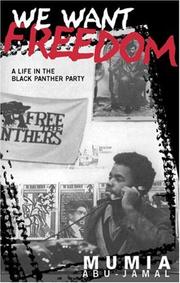| Listing 1 - 2 of 2 |
Sort by
|

ISBN: 0896087182 0896087190 Year: 2004 Publisher: Cambridge, Mass. : South End Press,
Abstract | Keywords | Export | Availability | Bookmark
 Loading...
Loading...Choose an application
- Reference Manager
- EndNote
- RefWorks (Direct export to RefWorks)
In his youth Mumia Abu-Jamal helped found the Philadelphia branch of the Black Panther Party, wrote for the national newspaper, and began his life-long work of exposing the violence of the state as it manifests in entrenched poverty, endemic racism, and unending police brutality and celebrating a people’s unending quest for freedom. In We Want Freedom, Mumia combines personal experience with extensive research to provide a compelling history of the Black Panther Party—what it was, where it came from, and what rose from its ashes. Mumia also pays special attention to the U.S. government’s disruption of the organization through COINTELPRO and similar operations.While Abu-Jamal is a prolific writer and probably the world’s most famous political prisoner, this book is unlike any of Mumia’s previous works. In We Want Freedom, Abu-Jamal applies his sharp critical faculties to an examination of one of the U.S.’s most revolutionary and most misrepresented groups. A subject previously explored by various historians and forever ripe for "insider" accounts, the Black Panther Party has not yet been addressed by a writer with the well-earned international acclaim of Abu-Jamal, nor with his unique combination of a powerful, even poetic, voice and an unsparing critical gaze. Abu-Jamal is able to make his own Black Panther Party days come alive as well as help situate the organization within its historical context, a context that included both great revolutionary fervor and hope, and great repression. In this era, when the US PATRIOT Act dismantles some of the same rights and freedoms violated by the FBI in their attack on the Black Panther Party, the story of how the Party grew and matured while combating such invasions is a welcome and essential lesson.
African American political activists --- Political activists --- African American prisoners --- Activistes noirs américains --- Activistes --- Prisonniers noirs américains --- Biography. --- Biography --- Biographies --- Abu-Jamal, Mumia. --- Black Panther Party --- History --- Philadelphia (Pa.) --- Philadelphie (Penns.) --- Race relations. --- Relations raciales --- Activistes noirs américains --- Prisonniers noirs américains --- History. --- Abu-Jamal, Mumia --- Race relations --- United States
Book
ISSN: 17719372 ISBN: 2846261156 9782846261159 Year: 2006 Publisher: Vauvert : Au diable Vauvert,
Abstract | Keywords | Export | Availability | Bookmark
 Loading...
Loading...Choose an application
- Reference Manager
- EndNote
- RefWorks (Direct export to RefWorks)
Après le scandale des prisons d'Afghanistan, de Guantanamo à Cuba et d'Abou Ghraïb en Irak, qui a révélé torture et violations des droits de l'homme, Angela Davis examine en quoi les prisons américaines sont le miroir d'un modèle démocratique fondé sur les inégalités sociales et raciales. Analyse du régime carcéral américain, critique d'un système qui bâtit des complexes pénitentiaires sur les ruines tenaces d'un passé esclavagiste, mise en cause d'une démocratie qui perpétue les inégalités à travers des institutions conçues comme un outil de contrôle de populations... Après l'abolition de l'esclavage, Angela Davis plaide ici pour le nouvel enjeu démocratique : abolir torture et prisons. Membre des Blacks Panthers et du Parti communiste américain, Angela Davis a été condamnée en 1970 à la peine capitale comme " ennemi d'État ". Après seize mois de détention, elle doit son acquittement et sa libération à une gigantesque mobilisation internationale. Figure mythique de la pensée progressiste et antiraciste américaine, elle enseigne aujourd'hui à l'université de Californie.
African Americans --- Political prisoners --- Torture --- Civil rights --- History --- Violence against --- Abuse of --- United States --- Race relations --- Activistes noirs américains --- Davis, Angela Y. --- États-Unis --- Relations raciales. --- African Americans - Civil rights - History --- African Americans - Violence against --- Political prisoners - Abuse of - United States --- Torture - United States --- United States - Race relations --- Violation des droits de l'homme --- Prisons --- 1990-....
| Listing 1 - 2 of 2 |
Sort by
|

 Search
Search Feedback
Feedback About UniCat
About UniCat  Help
Help News
News